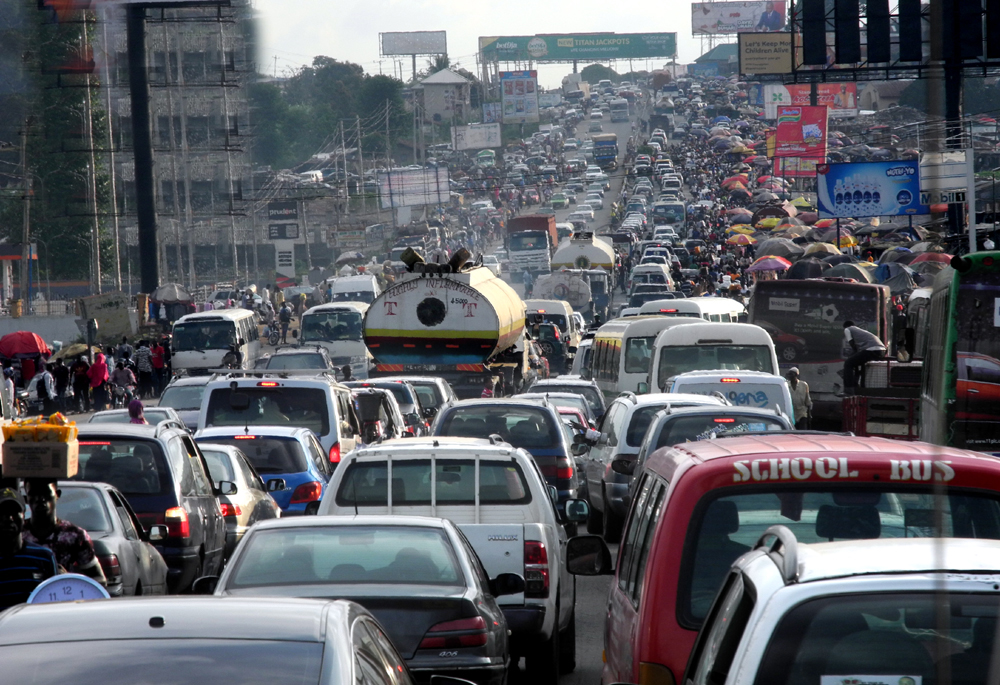Our Thursdays and Madalla market bottleneck
What makes Madalla noticeable by travelers and all motorists along the Kaduna to Lokoja Road is not because of its location on the FCT borderline, but its market, which is largely unplanned and functions every Thursday of the week. The market attracts patronage from the entire sub region. Unless it is the destination, otherwise, the […]

Pic.Traffic logjam on the Abuja-Kaduna Highway due to traing at Madalla Market in Niger
What makes Madalla noticeable by travelers and all motorists along the Kaduna to Lokoja Road is not because of its location on the FCT borderline, but its market, which is largely unplanned and functions every Thursday of the week. The market attracts patronage from the entire sub region. Unless it is the destination, otherwise, the wisest decision for motorists traversing through Madalla on Thursdays is to avoid it, due to the heavy traffic congestion it generates. A distance of approximately 500m along the road which can be covered in less than 2 minutes could last many hours. Traffic gridlock can be kilometers, most especially if there are accidents or broken down vehicles on the critical spot, which is usually frequent. For daily commuters to the City for work along the axis, Thursday is dreadful. On some of these days they are forced to abandon work and risk sacking.
A market of such caliber is an asset to the local community, a local economic booster and serves as a positive impact due to its proximity to the FCT. However, for a sustainable development and acceptable service delivery it requires planning, with adequate parking spaces, security, fire and all other relevant services. Unfortunately, all of these are practically absent. Its characteristic widespread on-street and haphazard parking along a major sloppy and heavily busy national road, rather than being an asset to the local authority, now constitutes eyesore, potential danger, impregnated and prone to environmental disasters. Some years ago, when the market population was less than the present, a particular road accident on a market day, involving a petrol tanker and other multiple vehicles claimed up to 48 lives on the spot.
The area is politically in Suleja Local Government of Niger State, but there are lingering boundary issues to be settled with the FCT, which is coordinated by the National Boundary Commission. Considering the several fatal accidents and environmental disasters that occurred on this spot over the years, the continuous existence of this market without any measure for averting future incidences from the concerned Authorities constitutes an embarrassment.
In the Regional Development Plan Chapter of the Abuja Master plan, such unplanned developments as witnessed in the borderline communities of the FCT were actually envisaged. It observed that, as the plan for the city and the whole territory begins to take form and outlines of issues relating to the development of the surrounding regions also begin to assume shape, one of the major issues is how to control unwanted urbanization both within the FCT and in the peripheral states adjoining it. In general the dynamics of spontaneous urban growth respond to transportation and economics. Characteristically, political boundaries tend to be ignored as it is readily apparent in almost all modern metropolitan areas throughout the world.
Consequently, As a result of problems resulting from the non-coincidence of political boundaries with natural geographic districts as well as the development problems resulting from access and proximity, the Abuja master plan recommended that special joint planning areas be established with the states surrounding the FCT. The Plan also categorically mentioned that those areas in the FCT adjoining highways, particularly highways linking with areas outside the territory shall require great attention.
Many issues contribute to the seeming lack of attention to the prevailing situation, which both the Niger State and FCT Authorities must address. In the first place, the Madalla market location, the way it is, midway adjacent to a sloppy national highway violates all rules of convenience, conformity and zoning regulations in all principles of modern Town Planning. There is also the issue of the neglect of the major recommendation of the Abuja Master plan which addresses the issue, in which all successive FCT administrations and the Niger State Government are culpable.
What boosted the population of the borderline communities is not the natural increase of the local indigenes, but the centripetal attraction of all Nigerians to the National Capital for earning livelihood. Only very few can afford accommodation in the City. Also, food stuff and household shopping needs are cheaper outside the City, hence the strong attraction to Madalla from the City residents on weekly basis, and the delivery of goods from other regions for trading. In such a multicultural and multidimensional setting, environmental disaster will cut across and affect all sections of the society any time it occurs.
The short term measure for eliminating the Madalla market traffic bottleneck challenges is stringent control and enforcement measures to be jointly coordinated by the FCT and Niger State Government on all the market days. On the long term, the market needs to be planned and relocated to a more conducive environment. Finally all boundary issues between the FCT and Niger State to be speedily resolved by the National Boundary Commission and all arrangements for the takeoff of the Joint Planning Districts recommendation of the Abuja Master plan is to be effected.
